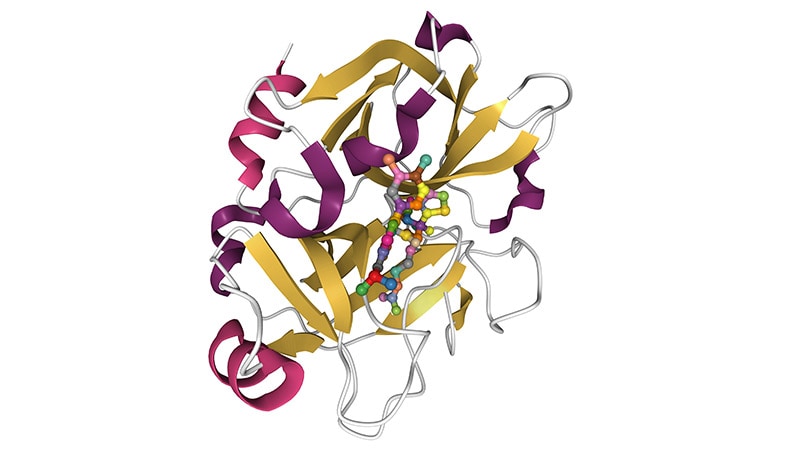Impressive Bleeding Profile of Factor XI Inhibitor in AF Study
Concetti Chiave
Factor XI inhibitor abelacimab shows significant reductions in bleeding in AF patients compared to rivaroxaban, offering a safer anticoagulant option.
Sintesi
The phase 2b AZALEA trial investigated the factor XI inhibitor abelacimab in AF patients, revealing substantial reductions in bleeding compared to rivaroxaban. Abelacimab, given monthly by injection, demonstrated a 67% reduction in major or clinically relevant nonmajor bleeding, with a 74% reduction in major bleeding and a 93% reduction in major gastrointestinal bleeding. The trial highlighted the potential of factor XI inhibitors to provide precise anticoagulation with minimal bleeding risks. Results from the trial, presented at the AHA Scientific Sessions 2023, emphasized the importance of safer anticoagulants for AF patients at risk of stroke. While the trial focused on bleeding outcomes, the low stroke rate observed was encouraging, indicating effective anticoagulation across all treatment arms. Further phase 3 trials are needed to determine the relative efficacy of factor XI inhibitors in stroke prevention compared to NOACs.
Impressive Bleeding Profile With Factor XI Inhibitor in AF
Statistiche
Abelacimab 150-mg dose associated with a 67% reduction in major or clinically relevant nonmajor bleeding.
Major bleeding reduced by 74%, major gastrointestinal bleeding reduced by 93%.
Abelacimab achieved 97% inhibition with the 90-mg dose and 99% inhibition with the 150-mg dose.
Citazioni
"We are seeing really profound reductions in bleeding with this agent vs a NOAC." - Christian Ruff
"If we look at the same population without anticoagulation, the stroke rate would be about 7% per year." - Christian Ruff
Approfondimenti chiave tratti da
by Sue Hughes alle www.medscape.com 11-13-2023
https://www.medscape.com/viewarticle/998418
Domande più approfondite
How might the introduction of safer anticoagulants impact the current standard of care for AF patients
The introduction of safer anticoagulants, such as factor XI inhibitors like abelacimab, could significantly impact the current standard of care for AF patients. Traditional anticoagulants like warfarin and NOACs have been associated with bleeding concerns, leading to non-adherence or discontinuation of treatment in a significant portion of patients. With the impressive bleeding profile demonstrated by factor XI inhibitors in the AZALEA trial, there is a real possibility of a paradigm shift in the management of AF. Safer anticoagulants could offer physicians a more effective and well-tolerated option for stroke prevention in AF patients, especially those at moderate to high risk. The substantial reductions in major bleeding, particularly major GI bleeding, seen with abelacimab suggest that these agents could provide a much-needed solution for patients who are currently undertreated due to bleeding risks. This advancement could lead to improved patient outcomes, increased adherence to anticoagulant therapy, and ultimately a reduction in the burden of stroke and other thrombotic events in AF patients.
What potential challenges or limitations could arise from widespread adoption of factor XI inhibitors in clinical practice
Despite the promising results of the AZALEA trial and the potential benefits of factor XI inhibitors in AF management, there are several challenges and limitations that could arise from their widespread adoption in clinical practice. One significant challenge is the need for further evidence from large-scale phase 3 trials to confirm the efficacy and safety of these agents compared to existing anticoagulants. While the phase 2b trial showed remarkable reductions in bleeding with abelacimab, the long-term effects, optimal dosing, and potential side effects of factor XI inhibitors need to be thoroughly evaluated in larger patient populations. Additionally, the cost-effectiveness of these novel anticoagulants compared to standard therapies like NOACs and warfarin will be a crucial consideration for healthcare systems and payers. Furthermore, the requirement for subcutaneous injections of factor XI inhibitors, as opposed to oral administration of NOACs, may pose challenges in terms of patient acceptance, convenience, and adherence to treatment regimens. Addressing these challenges will be essential to ensure the successful integration of factor XI inhibitors into routine clinical practice for AF management.
How can the findings of this study contribute to the broader conversation on personalized medicine and precision healthcare
The findings of the AZALEA trial on factor XI inhibitors like abelacimab contribute significantly to the broader conversation on personalized medicine and precision healthcare. The concept of precision anticoagulation, targeting factor XI to reduce thrombotic events without causing excess bleeding, exemplifies the potential of tailored therapies based on individual patient characteristics and risk profiles. By inhibiting a specific factor involved in thrombus formation, factor XI inhibitors offer a more targeted approach to anticoagulation, potentially minimizing adverse effects and optimizing treatment outcomes. This personalized medicine approach aligns with the broader trend in healthcare towards precision medicine, where treatments are tailored to the unique genetic, environmental, and lifestyle factors of each patient. The results of the AZALEA trial underscore the importance of advancing precision healthcare in cardiology, paving the way for the development of safer and more effective anticoagulants that can be tailored to the specific needs of AF patients.
0
